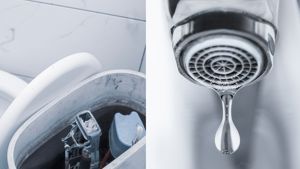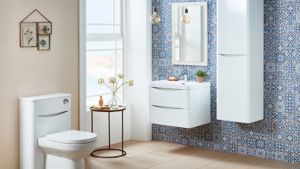Noises around the home can be a regular occurrence, especially in the bathroom with all the pipes, drains, toilets and taps. And it's safe to say that most of us go about our daily business without a care in the world or a second thought for them.
But when do these sounds signal an issue we shouldn’t ignore?
The truth is that most are common and nothing to worry about, but there are certain noises, especially in the bathroom, that we should listen to and take action quickly or risk hundreds of pounds worth of damage.
1. Dripping tap
If you have a dripping bathroom tap it can be a real nuisance. While it’s not an emergency, the longer you leave it the more costly it will become. You can ignore it, if you can bear the noise, but a drip can quickly turn into a trickle and start wasting you serious money on your water bills. A trickling tap of around 240 drips per minute, that’s four per second, is going to cost an additional £52.68* a year while a drip of one per second will add £13.17. And if it’s a hot water tap, then you have to consider this can soon climb to hundreds of pounds a year.
Usually a dripping tap can be prevented with a simple fix and probably doesn’t require you to call a plumber. Typically, a leaking tap is caused by a degraded tap washer, this is usually identified by water dripping or leaking from the tap spout, so simply replacing the washer can fix the issue and start saving you money. A pack of 13 tap washers can be bought for as little as £3.99 so around 30p per washer.
If you're considering investing in a new basin or bath tap then always look for those with ceramic disc technology which prevents unwanted leaks or drips.
2. Gurgling toilet
Many of us flush and run without really paying any attention to the sounds that come from the bowl behind us. But, if you flush your toilet and it replies with a gurgling or bubbling sound then this would indicate that you have a partial or full clog and water is starting to back up in the pipes. This will trap air which can only escape through the toilet bowl itself causing that bubbling or gurgling sound.
One of the easiest ways to clear any blockage is to use a plunger. The act of plunging up and down within the toilet bowl creates suction which is strong enough to remove the clogged waste and allow the water to flow freely. Before you start, it’s a good idea to block off other openings where air can escape, such as the sink or shower, using old rags, as this will give you much more plunging force. Use a bell plunger which is the most suitable for a toilet and coat it with plumber's grease or petroleum jelly to create an airtight seal. You want to get water inside the plunger and then evacuate the clog so place it in the bowl and allow water to flow in before tilting it directly into the throat of the bowl to create the vacuum. You can then plunge up and down until the clog is removed.
Toilet tech has become vast in recent years from hygienic rimless toilets to energy saving features like dual flush cisterns and also quick release hinges that allow you to fully remove the seat for more efficient cleaning.
3. Banging towel rail or radiator
If you suddenly notice a banging sound coming from the radiator or towel rail in your bathroom then time is of the essence. This can be caused by kettling, which is a build up of limescale in your central heating system, not actually your radiators themselves. Hard water areas such as the South and East of England are prone to kettling, thus people living in those areas may notice this noise coming from their radiator more often. The longer you leave it, the less efficient your radiator will be and this will be wasting energy and costing extra money on your bills.
You can usually solve this by draining your radiator to free up trapped water and air. You need to ensure you turn off the boiler and gas supply, turn off the intake valve and wait for the radiator to cool down and open the drain valve again. You should have some liquid released by the radiator which you can catch in a bowl, at this point you can turn the valve off and turn everything back on.
If the banging noise persists, it may be that you need to have your boiler power flushed to ensure all the limescale and grime is removed. This will minimise future sounds and keep your heating as efficient as possible.
Looking for ways to save energy, money and protect the environment? We've put together a handy guide on how to have a more eco-friendly bathroom.
4. Whistling windows
If you walk into your bathroom and wonder why the window is open only to find it’s not, then it’s likely you will also hear a whistling or ‘windy’ sound coming from them when it’s blowing outside. Usually, the whistling sounds are the result of wind passing through a slight gap in the window. For example, if sealant around the edge of the glass has shrunk or deteriorated then the wind will be able to get through. This is not only allowing cold air to enter but also warm air to escape causing it to feel uncomfortable but also wasting energy and money.
Check the edges of your window and the surrounding wall to identify any draughts.
Filling any gaps and replacing sealant will usually do the trick. You can also add insulation film to the window pane to help boost the efficiency. If this doesn’t improve the soundproofing then it might be the case of replacing the window.
5. Hissing fixtures
Hissing sounds in the bathroom signal trouble. Whether it's from your toilet, sink or pipes in the walls, they need addressing and quick. If you notice hissing coming from a water fixture then it’s probably due to your water pressure being too high.
This can be fixed quite simply so don’t let it linger. If you ignore the sound it can lead to high water bills but it also adds unnecessary stress to your pipes which will reduce their lifespan and can cost around £1500 plus to repair.
If this article has signalled some nervous twitching about bathroom sounds and problems, then please don't fret! Check out all our How To Guides for detailed DIY tips on fixing common bathroom problems. If in doubt, always call your trusted local professional!







